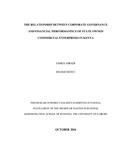| dc.description.abstract | The environment in which the state owned commercial enterprises operate is not static; it
is made up of radically changing internal and external behavior patterns. The aim of this
study was to establish whether there is a relationship between the corporate governance
and financial performance of state owned commercial enterprises in Kenya. The study
was conducted using data from 127 state owned enterprises. The sample was selected
based on the percentage of the Government of Kenya (GoK) shareholding. Half (50%) of
both the majority (between 51% to 99% ownership) and minority (50% and below
ownership) GoK shareholdings commercial enterprises were selected, this made a sample
of 42 state owned commercial enterprises. The questionnaires were administered to
senior officers of the sampled 42 state owned commercial enterprises in Kenya; these are
the Directors, CEOs, Managers and Chief Officers. Out of the 42 questionnaires
distributed; 33 questionnaires were received back fully answered, making a response rate
of 78.50%. This was an excellent response as per the case of Mugenda (2003). The
corporate governance elements employed in the study were the size of BODs, their
gender, their educational level, their working experience, their independence, the audit
committee’s competence and the duality of the CEOs, which were all found to be directly
related to the financial performance of the state owned commercial enterprises.
Regression model was employed in the analysis of data to estimate the quantitative effect
of corporate governance on the financial performance of the state owned commercial
enterprises in Kenya. The study established a Pearson correlation value R of 0.5713
which depicts that there is a linear dependence of corporate governance elements on
return on assets (ROA). R square revealed that governance attributes influenced about
76.85% of variation in return on asset. The value of adjusted R square was established to
be of 77% which clearly brought out that the relationship between the ROA of the state
owned commercial enterprises and corporate governance is strongly positive. Generally,
the study came to a conclusion that there exists a positive relationship between corporate
governance and financial performance of the state owned commercial enterprises in
Kenya. This implies that a good corporate governance practices (a bigger size of BODs
of at least 12 members with an inclusion of female members, ensuring the directors are
well educated and have a good experience in their respective area of study, the audit
committee’s independence and competence and allocation of the positions of the CEO
and COB to different parties) enhances good financial performance of the enterprises.
Therefore, the policy makers and the management of the enterprises need to ensure that
the tenets of good corporate governance are applied to the latter so as to enable them
realize a better financial performance. | en_US |

